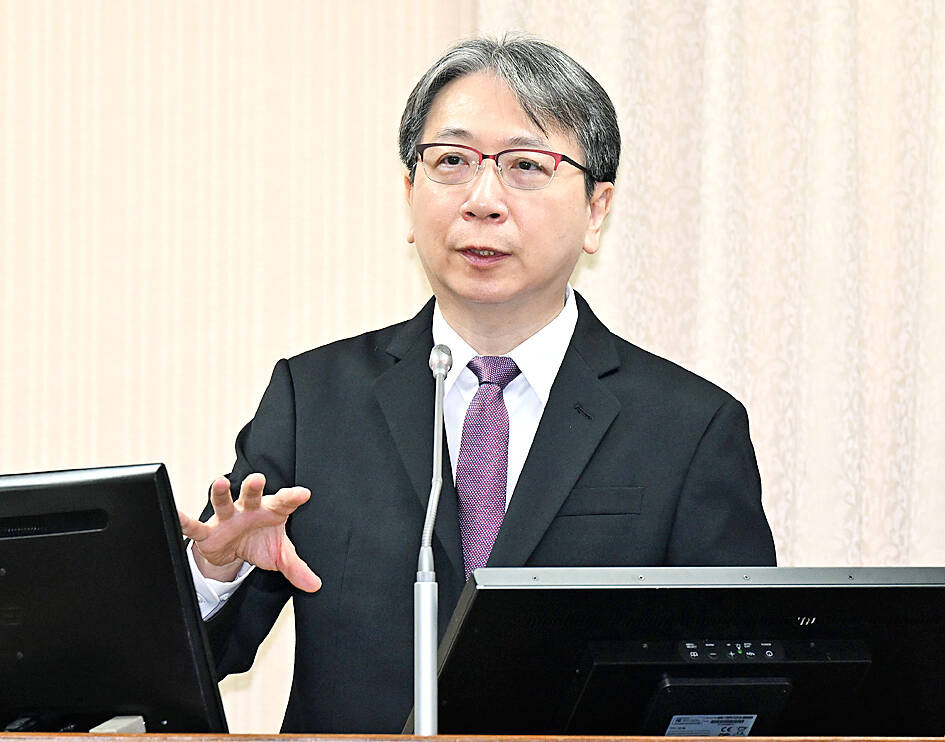China’s “patriots” model is what Beijing used in Hong Kong and Macau, and has no market in Taiwan, National Security Bureau (NSB) Director-General Tsai Ming-yen (蔡明彥) said yesterday, in response to stronger rhetoric from Beijing ahead of a meeting between US President Donald Trump and Chinese President Xi Jinping (習近平).
China’s Taiwan Affairs Office spokesperson Peng Qingen (彭慶恩) told a regular news conference in Beijing earlier yesterday that peaceful “reunification” under the “one country, two systems” model is the fundamental approach to “resolving the Taiwan issue.”
“We are willing to create ample space for peaceful reunification and will spare no effort to pursue this prospect with the utmost sincerity,” he said. “However, we absolutely will not renounce the use of force and reserve the option to take all necessary measures.”

Photo: Liao Chen-huei, Taipei Times
The comment struck a tougher tone than a series of articles in state media this week that pledged benign rule.
China has never renounced the use of force to “reunify” with Taiwan, but the policy is not often directly voiced in public and did not appear in three Xinhua news agency commentaries this week about Taiwan.
One of the commentaries mapped out how “patriots” could rule Taiwan after “reunification,” and promised its existing social system and way of life would be respected.
Beijing’s top official in charge of Taiwan policy, the Chinese Communist Party’s fourth-ranked leader Wang Huning (王滬寧), did not mention force in a key policy speech on Saturday, which instead focused on how both sides would benefit from “reunification.”
In Taipei, Tsai said that Beijing has “no way to enact the application of the Macau or Hong Kong model in Taiwan.”
“The aim is to belittle Taiwan’s international standing, and Hong Kong-ify and Macau-ify Taiwan, to achieve the political objective of eliminating Taiwan’s sovereignty, which the Chinese Communist Party seeks to do,” Tsai said.
In 2021, Hong Kong, which returned to Chinese rule from the UK in 1997, held its first “patriots-only” election with candidates vetted as loyal to Beijing. Turnout hit a record low.
Taiwan held its first direct presidential election in 1996, and democracy is a noisy and vibrant affair where candidates are free to espouse any point of view — be it pro-independence or pro-Beijing.
China’s government refuses to talk to President William Lai (賴清德), saying he is a “separatist.”
The Taiwanese government rejects Beijing’s sovereignty claims.
China’s renewed push for an autonomy model for Taiwan — which no major Taiwanese political party supports and the government in Taipei has repeatedly denounced — comes ahead of a meeting between Trump and Xi today.
Trump told reporters yesterday that he did not know whether he would even discuss Taiwan with Xi.

Taiwan has received more than US$70 million in royalties as of the end of last year from developing the F-16V jet as countries worldwide purchase or upgrade to this popular model, government and military officials said on Saturday. Taiwan funded the development of the F-16V jet and ended up the sole investor as other countries withdrew from the program. Now the F-16V is increasingly popular and countries must pay Taiwan a percentage in royalties when they purchase new F-16V aircraft or upgrade older F-16 models. The next five years are expected to be the peak for these royalties, with Taiwan potentially earning

STAY IN YOUR LANE: As the US and Israel attack Iran, the ministry has warned China not to overstep by including Taiwanese citizens in its evacuation orders The Ministry of Foreign Affairs (MOFA) yesterday rebuked a statement by China’s embassy in Israel that it would evacuate Taiwanese holders of Chinese travel documents from Israel amid the latter’s escalating conflict with Iran. Tensions have risen across the Middle East in the wake of US and Israeli airstrikes on Iran beginning Saturday. China subsequently issued an evacuation notice for its citizens. In a news release, the Chinese embassy in Israel said holders of “Taiwan compatriot permits (台胞證)” issued to Taiwanese nationals by Chinese authorities for travel to China — could register for evacuation to Egypt. In Taipei, the ministry yesterday said Taiwan

Taiwan is awaiting official notification from the US regarding the status of the Agreement on Reciprocal Trade (ART) after the US Supreme Court ruled US President Donald Trump's global tariffs unconstitutional. Speaking to reporters before a legislative hearing today, Premier Cho Jung-tai (卓榮泰) said that Taiwan's negotiation team remains focused on ensuring that the bilateral trade deal remains intact despite the legal challenge to Trump's tariff policy. "The US has pledged to notify its trade partners once the subsequent administrative and legal processes are finalized, and that certainly includes Taiwan," Cho said when asked about opposition parties’ doubts that the ART was

If China chose to invade Taiwan tomorrow, it would only have to sever three undersea fiber-optic cable clusters to cause a data blackout, Jason Hsu (許毓仁), a senior fellow at the Hudson Institute and former Chinese Nationalist Party (KMT) legislator, told a US security panel yesterday. In a Taiwan contingency, cable disruption would be one of the earliest preinvasion actions and the signal that escalation had begun, he said, adding that Taiwan’s current cable repair capabilities are insufficient. The US-China Economic and Security Review Commission (USCC) yesterday held a hearing on US-China Competition Under the Sea, with Hsu speaking on